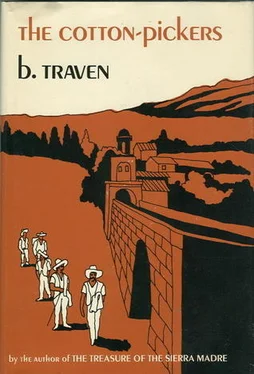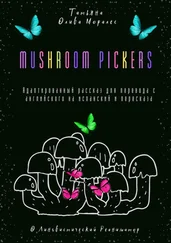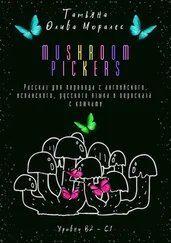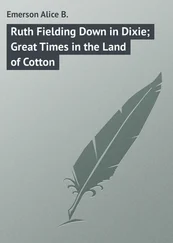B. Traven - The Cotton-Pickers
Здесь есть возможность читать онлайн «B. Traven - The Cotton-Pickers» весь текст электронной книги совершенно бесплатно (целиком полную версию без сокращений). В некоторых случаях можно слушать аудио, скачать через торрент в формате fb2 и присутствует краткое содержание. Год выпуска: 1969, Издательство: Hill and Wang, Жанр: Проза, на английском языке. Описание произведения, (предисловие) а так же отзывы посетителей доступны на портале библиотеки ЛибКат.
- Название:The Cotton-Pickers
- Автор:
- Издательство:Hill and Wang
- Жанр:
- Год:1969
- ISBN:нет данных
- Рейтинг книги:3 / 5. Голосов: 1
-
Избранное:Добавить в избранное
- Отзывы:
-
Ваша оценка:
- 60
- 1
- 2
- 3
- 4
- 5
The Cotton-Pickers: краткое содержание, описание и аннотация
Предлагаем к чтению аннотацию, описание, краткое содержание или предисловие (зависит от того, что написал сам автор книги «The Cotton-Pickers»). Если вы не нашли необходимую информацию о книге — напишите в комментариях, мы постараемся отыскать её.
—Book World
The Cotton-Pickers — читать онлайн бесплатно полную книгу (весь текст) целиком
Ниже представлен текст книги, разбитый по страницам. Система сохранения места последней прочитанной страницы, позволяет с удобством читать онлайн бесплатно книгу «The Cotton-Pickers», без необходимости каждый раз заново искать на чём Вы остановились. Поставьте закладку, и сможете в любой момент перейти на страницу, на которой закончили чтение.
Интервал:
Закладка:
We drove them into the field with the picked herd, and the battle for leader began. The bulls who were indifferent to the honor got themselves as far out of the way as possible, and the battle soon centered on five of them. The victor, still bleeding profusely, charged toward one of the cows in heat, who pushed her way toward him. We attended to all the wounded bulls immediately; and after the victor had spent himself and returned to his herd senses, he too got his medicine. For if the wounds weren’t treated promptly, they’d soon be full of maggots, and it’d be a long and tedious job getting them out.
Worms, maggots, and ticks are a big problem with any herd, anywhere, but worst of all in the tropics. And if cattle start losing weight, their skin dries out, and deadens, and the lean cattle are in danger of being eaten alive by worms and ticks. Healthy animals, however, are attacked only by limited numbers of pests which can easily be kept under control.
Once we had cut out the thousand head of cattle, Mr. Pratt, a very generous man, gave me five extra healthy ones as replacements for those five in a thousand who were certain to fall sick or fail to survive the long drive.
Then I was given a hundred pesos cash in silver for transport expenses, besides some checks I could cash in case of emergency, and I was also given the delivery note to the terminal pasture. Then Mr. Pratt handed me a map.
The less said about this map, the better. You can put anything you like upon a map: roads, rivers, villages, towns, grasslands, water pools, mountain passes, and plenty more. Paper is patient; it won’t refuse anything. But, though a river or a bridge appears on a map, it doesn’t mean that you’re going to find it where it is supposed to be.
It was a real joy to hear Mrs. Pratt swearing; every other word was “son-of-a-bitch,”
“bastard,” or “f—ing,” and more in the same beautiful strain. On a rancho like theirs, it could be damned lonely, and the nights were long, so you couldn’t blame her for living her life as intensely as existence on a cattle rancho permitted. How else was the poor woman to use up the surplus energy, which, had she lived in a village or town, would have gone into chatting and gossiping with the neighbors all day? To her, everything was son-of-a-bitch; her husband, I, the Indians, the fly that dropped into her coffee cup, the Indian girl in the kitchen, her finger that she cut, the hen that fluttered on the table and upset the soup pot, her horse that moved too slowly — yes, every object between heaven and earth was to Mrs. Pratt a son-of-a-bitch.
They had a phonograph and we danced nearly every evening. For a number of reasons, I preferred to dance with the Indian kitchen maid; but Ethel, Mrs. Pratt, danced far better, and we got onto such good terms that one night she told me quite frankly in her husband’s presence that she’d like to marry me if her husband should die or divorce her.
She was a fine woman, Mrs. Pratt, she certainly was, and I wouldn’t hear a word against her. A woman who can handle the wildest horse, swear to make a sergeant major wince, a woman before whom tough vaqueros trembled and with whom bandits kept their distance, a woman who in the presence of her husband (whom she seemed to love) could quite soberly declare that she’d like to marry me if he died or left her — damn it, a woman like that could stir you even if you didn’t care much about the so-called weaker sex.
As we were leaving, Ethel Pratt stood on the long veranda and waved good-bye. “Good luck, boy! You’re always welcome on this rancho. Hey, Suarez, you dirty dog, you filthy son-of-a-goddamned-old-bitch, can’t you see that black one is breaking out? Where are your f—ing eyes? Well, boy, good-bye!”
I waved my hat, and Gitano swept off with me.
23
Yes, we were off. We broke out. The yelling, the shouting, the calling, the high-pitched shrieking of the Indians; the sound of the short-handled whips cutting through the air; the trampling of hoofs and all the uproar as a column of beasts shied off, rushed away, and had to be blocked in, lest it lost contact with the main herd.
The first day is always one of the hardest, so Mr. Pratt came along with us. The herd is still only loosely knit, and a sense of belonging together does not develop until the transport has been underway a few days, until the herd knows the leader bull and gets the smell of mutual kinship. Then the family feeling, rather the herd feeling, emerges and the animals want to stay with their herd.
But they didn’t stay together like a flock of sheep kept in order by a shepherd and a dog. For these cattle, born and raised on vast ranges among Mr. Pratt’s twelve-thousand-headed herd, were accustomed to space, and they wanted to spread out, run loose. The dogs we took with us couldn’t make much of a showing, for they tired easily and could be used only for small jobs. Thus it was a constant galloping back and forth, shouting and yelling.
I had a police whistle with me as a signal for the boys; the foreman had an ordinary whistle, easily distinguished from mine. I put the foreman at the head and I took the rear, as it afforded a better view of the field of transport, and it seemed easier to me to direct operations from there.
What more beautiful sight could there be than a giant herd of healthy half-wild cattle! There they were ahead of me, trampling and stamping-the heavy necks, the rounded bodies, the proud, mighty horns. It was a heaving sea of gigantic vitality, of brute nature herded along by one single purpose. And each pair of horns represented a life in itself, a life with its own will, its own desires, its own thoughts and feelings.
From saddle-height I surveyed the whole of this ocean of horns and necks and rumps. I could perhaps have walked on the broad backs of the animals across the entire herd up to the belied bulls in front.
The animals bellowed singly and in chorus. They quarreled and pushed each other around. Shouts and calls went up. The bells clattered. The sun smiled and blazed. Everything was green — the land of perpetual summer. Oh, beautiful, wonderful land of everlasting springtime, rich with legend, dance, and song! You have no equal anywhere on this earth.
I couldn’t help singing. I sang whatever came into my head, hymns and sweet folk airs, love songs and ditties, operatic arias, drinking songs and bawdy songs. What did I care what the songs were about? What did the melody matter? I sang from a heart full of joy.
And what magic air! The hot breath of the tropical bush, the warm, sultry sweat of the mass of moving cattle, the heavy vapors from a nearby swamp wafted to us by the wind.
Thick droves of buzzing horseflies and other insects circled over the trotting herd, and dense clouds of glittering green flies followed us to settle on the dung. Blackbirds accompanied us in whole flocks, lighted on the backs of the beasts to pick ticks and bugs from their hides. Untold thousands of creatures lived off this mighty herd. Life and life! Everywhere nothing but life.
Our march took us over country roads for a few days, with fields and pastureland on either side fenced in with barbed wire. Of course such pastures can’t be used without the owner’s consent, so our herd had to graze along the roadsides, which proved to be ample, and there were sufficient water pools still full from the rainy season.
When cars or trucks or pack caravans passed along the roads there was quite some performance, for we had to push the herd to one side; but the cattle would break away, wheel around, and hightail it singly or in groups for several miles. Then we’d have to give chase and round them up, drive them into the herd again.
It was even more complicated when we came to open pastures where other cattle were grazing in herds, often without herders. Sometimes these herds mixed in with ours and had to be sorted out; on one occasion this took practically a whole day, for we couldn’t drive off a single head of another rancher’s cattle. Had we done so, it would have led to unholy difficulties for which I, and in the last resort Mr. Pratt, would have been held responsible.
Читать дальшеИнтервал:
Закладка:
Похожие книги на «The Cotton-Pickers»
Представляем Вашему вниманию похожие книги на «The Cotton-Pickers» списком для выбора. Мы отобрали схожую по названию и смыслу литературу в надежде предоставить читателям больше вариантов отыскать новые, интересные, ещё непрочитанные произведения.
Обсуждение, отзывы о книге «The Cotton-Pickers» и просто собственные мнения читателей. Оставьте ваши комментарии, напишите, что Вы думаете о произведении, его смысле или главных героях. Укажите что конкретно понравилось, а что нет, и почему Вы так считаете.











